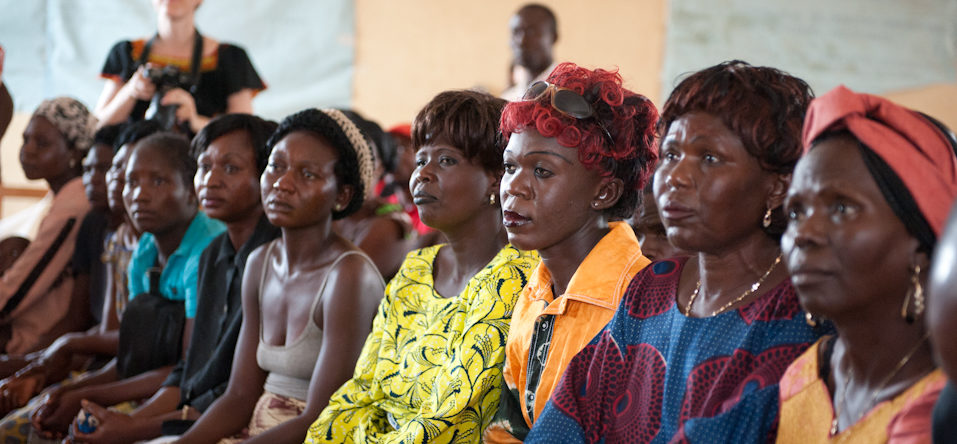Since 2024, the United Nations Women’s Peace and Humanitarian Fund (WPHF) is mobilizing new resources for local civil society organizations and women activists in the Central African Republic (CAR) working to provide essential humanitarian assistance to women and girls and advance their participation in peacebuilding and recovery activities across the country.
CAR Call for Proposals - Round 1: OpenOverview
In CAR, WPHF is supporting local women’s organizations in the country working on projects contributing to the following impact areas:
- Impact Area 3: Humanitarian and Crisis Response
- Impact Area 6: Peacebuilding and Recovery
What’s happening in CAR?
After decades of intermittent conflict, resulting in internal displacement and worsening of structural and socio-economic issues, CAR remains one of the worst humanitarian crises and among the most fragile countries worldwide. Due to its location at the center of an unstable Central African region, regional crises have led to one in five Central Africans being displaced within the country or abroad, particularly in neighboring countries. The country’s downward trend in refugees and internal displacements, as well as the increased influx of returnees over the past few months, has impacted the needs in shelters, National Financial Inclusion Strategies (NFIs), and general goods and services to recreate dignified living conditions.
CAR remains in the last positions in various rankings regarding human development, violence, governance, fragility or humanitarian crisis. 46% of the population – or 2.8 million people – are expected to be extremely vulnerable in 2024, according to the 2024 Humanitarian Response Plan released by the UN Office for the Coordination of Humanitarian Affairs (OCHA), and 2.5 million people are facing food insecurity as the healthcare system is on the brink of collapse.
Despite returning to constitutional legality and holding elections in 2020 after multiple coups, CAR remains politically unstable due to armed groups that frequently violate the 2019 Political Accord for Peace and Reconciliation (APPR). The country’s low population density and rich natural resources (fertile land, tropical meteorology, and mineral resources) also attract illegal exploitation, adding to its challenges.
What is the situation for women and girls in CAR?
UN Women’s CAR Gender Profile indicates that the country has made significant progress in gender equality and the empowerment of women and girls, but many challenges remain. These include widespread insecurity, human rights violations, the loosening of community ties and the breakdown of the family base, and patriarchal customs and religious rites that put women in a situation of structural dependence in relation to men.
According to the Gender Inequality Index (GII), CAR is among the five worst countries to be a woman. Exacerbated by socio-cultural norms, gender-based violence (GBV) has reached alarming proportions. In 2024, more than two people – mostly women and girls – were victims of GBV every hour. In the first half of the same year, over 11,000 cases of GBV were reported, the majority of which were rape cases (32%). On top of this, the prolonged humanitarian crisis, which causes increasing stress within households, is leading to transactional sex, forced and early marriage of girls, and levirate and sororate marriage, among other issues.
Across CAR, women remain marginalized in decision-making and peacebuilding processes despite the development and ongoing implementation of the second National Action Plan (NAP) on Resolution 1325 of the UN Security Council on Women, Peace, and Security (WPS).
Why is it important to support local women’s organizations across CAR?
Since CAR has a relative freedom of action – except when the position of civil society organizations is seen as going against dominant political opinion – local women’s organizations are promoting peace, human rights, and the well-being of women and girls, even in remote areas of the country. However, obstacles such as limited technical capacity, scarce material resources, and inadequate funding restrict their ability to provide sustained and effective support to communities.
Given the worsening humanitarian and displacement crises, rampant human rights violations, and the rise of GBV, local women’s organizations across CAR are ensuring that women and girls are at the heart of all peacebuilding, humanitarian, and recovery efforts despite the challenges they face. Channeling funds to local women’s groups will support women as key actors in their communities to build a more inclusive, just, and sustainable peace.
